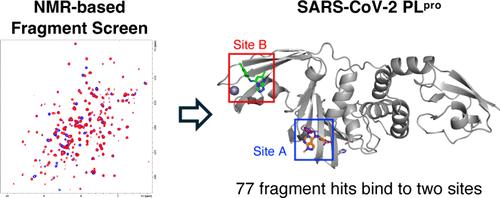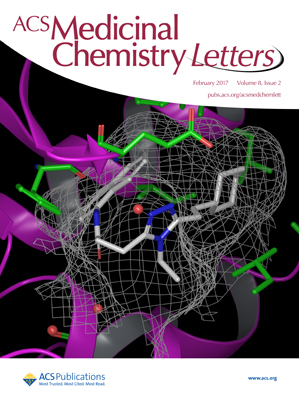基于片段的 SARS-CoV-2 Papain 样蛋白酶(PLpro)筛选
IF 4
3区 医学
Q2 CHEMISTRY, MEDICINAL
引用次数: 0
摘要
由于冠状病毒的传播率很高,在过去二十年里,冠状病毒曾多次导致病毒爆发。最致命的疫情是最近的 Covid-19 大流行,造成全球 700 多万人死亡。SARS-CoV-2 木瓜蛋白酶(PLPro)在病毒复制和宿主免疫抑制中起着关键作用,在冠状病毒家族中高度保守,因此是理想的药物靶点。在本文中,我们介绍了利用蛋白质观测核磁共振实验对 PLPro 进行的片段筛选,确定了 77 个命中片段。对核磁共振扰动模式和 X 射线共晶体结构的分析表明,片段与蛋白质的两个不同区域结合。重要的是,所发现的片段没有一个与已报道的少数抑制剂属于同一化学类别,从而发现了一类新型的 PLPro 抑制剂。本文章由计算机程序翻译,如有差异,请以英文原文为准。

Fragment-Based Screen of SARS-CoV-2 Papain-like Protease (PLpro)
Coronaviruses have been responsible for numerous viral outbreaks in the past two decades due to the high transmission rate of this family of viruses. The deadliest outbreak is the recent Covid-19 pandemic, which resulted in over 7 million deaths worldwide. SARS-CoV-2 papain-like protease (PLPro) plays a key role in both viral replication and host immune suppression and is highly conserved across the coronavirus family, making it an ideal drug target. Herein we describe a fragment-based screen against PLPro using protein-observed NMR experiments, identifying 77 hit fragments. Analyses of NMR perturbation patterns and X-ray cocrystallized structures reveal fragments bind to two distinct regions of the protein. Importantly none of the fragments identified belong to the same chemical class as the few reported inhibitors, allowing for the discovery of a novel class of PLPro inhibitors.
求助全文
通过发布文献求助,成功后即可免费获取论文全文。
去求助
来源期刊

ACS Medicinal Chemistry Letters
CHEMISTRY, MEDICINAL-
CiteScore
7.30
自引率
2.40%
发文量
328
审稿时长
1 months
期刊介绍:
ACS Medicinal Chemistry Letters is interested in receiving manuscripts that discuss various aspects of medicinal chemistry. The journal will publish studies that pertain to a broad range of subject matter, including compound design and optimization, biological evaluation, drug delivery, imaging agents, and pharmacology of both small and large bioactive molecules. Specific areas include but are not limited to:
Identification, synthesis, and optimization of lead biologically active molecules and drugs (small molecules and biologics)
Biological characterization of new molecular entities in the context of drug discovery
Computational, cheminformatics, and structural studies for the identification or SAR analysis of bioactive molecules, ligands and their targets, etc.
Novel and improved methodologies, including radiation biochemistry, with broad application to medicinal chemistry
Discovery technologies for biologically active molecules from both synthetic and natural (plant and other) sources
Pharmacokinetic/pharmacodynamic studies that address mechanisms underlying drug disposition and response
Pharmacogenetic and pharmacogenomic studies used to enhance drug design and the translation of medicinal chemistry into the clinic
Mechanistic drug metabolism and regulation of metabolic enzyme gene expression
Chemistry patents relevant to the medicinal chemistry field.
 求助内容:
求助内容: 应助结果提醒方式:
应助结果提醒方式:


